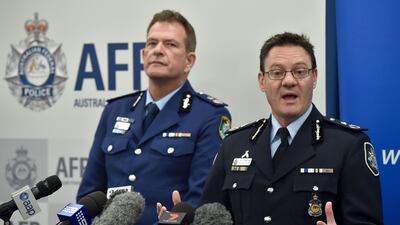A man instructed by ISIL to bring down an Etihad Airways flight tried to use an unsuspecting passenger to carry a bomb on board, with a second poisonous gas plot also in the works, Australian police announced on Friday.
Khaled Khayat, 49, and Mahmoud Khayat, 32, have been charged with two counts of "acts done in preparation for, or planning, a terrorist act" and are next due in court on November 14.
The airline confirmed that it has been investigating the incident with Australian authorities.
"Etihad has worked closely with the Australian Federal Police in its investigation into the incident” said an Etihad spokesman.
"The safety and security of our passengers and crew is always Etihad Airways' topmost priority. Working closely with the relevant authorities in each country, Etihad Airways implements the most stringent security measures throughout all of our operations worldwide".
Police claim one of the men planted the bomb in the passenger's luggage. Local reports said the luggage belonged to the man's own, innocent, brother.
"We will be alleging the person who was to carry the improvised explosive device (IED) had no idea they were carrying an IED," said Australian Federal Police Deputy Commissioner Michael Phelan.
"There is a little bit of conjecture as to why it didn't go ahead. It didn't get past the check-in".
“It didn’t get through possibly because the baggage was too heavy, or possibly because the suspects backed out at the last moment” Mr Phelan said.
The second plan was hatched after the first one failed, police alleged, and was not necessarily targeted at a plane.
"They were talking about crowded closed spaces, you know, potentially public transport, and so on, but they got nowhere near making one" said Mr Phelan.
The plot was orchestrated by "a senior member of the Islamic State" based overseas.
Police would not reveal who the ISIL link was but said it will be alleged the men were introduced to him by a relative who is a senior ISIL member in Syria.
The explosives, which originated in Turkey, “were allegedly sent to Australia on a cargo flight and ISIL also provided instructions to build the second device” police said.
The improvised device, using "high military-grade explosive", was due to be smuggled onto a July 15 service from Sydney, but the attempt was aborted before they reached security.
"It is a concern that it got through" said Phelan about the bomb components arriving in Australia through the mail.
“The homemade bomb was fairly well advanced but not enough to be a fully initiated device”.
The details Mr Phelan provided are the first that officials have released since four men were arrested in a series of raids in Sydney last weekend.
The two suspects if found guilty of terrorism charges face life in prison. A third man remains in custody, while a fourth was released earlier this week.
The alleged plot prompted authorities to tighten security at all major international and domestic terminals across Australia.
Justice Minister Michael Keenan said the impacts "could have been catastrophic".
"I understand that Australians will feel very unnerved about hearing this news and the police allege that we have been the target of a very serious ISIL plot" he said.
"But I do want to remind everyone that this is the 13th time, because of the excellence of our law enforcement agencies, that we have been able to stop a terrorist attack from occurring on Australian soil in the past three years".

